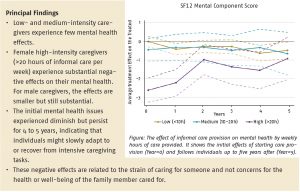The Dynamic Effects of Informal Caregiving on Caregivers’ Health
“High-intensity caregivers experience a substantial and persistent impact on their mental health”
Ageing populations in developed economies pose a challenge to healthcare systems. Informal care provided by relatives or friends could help meet the growing demand for longterm care (LTC) while keeping LTC costs low. However, data from the United Kingdom, where informal care is a fundamental pillar of the long-term care sector, reveal that high-intensity caregivers experience long-term and substantial negative effects on their mental health. This burden on informal care providers merits careful consideration in LTC policy.

Key Takeaways for the Industry
- Policymakers should strike a careful balance between the benefits of informal care for public healthcare systems and care recipients and its impact on individual caregivers.
- High-intensity informal caregivers (>20 hours per week) are at particular risk and require targeted support.




